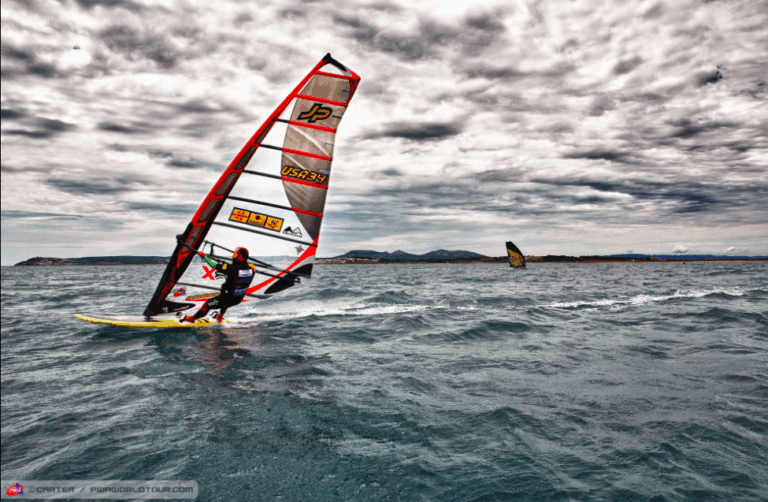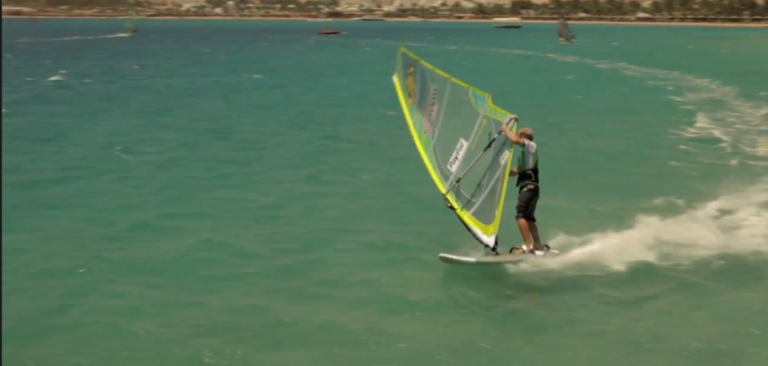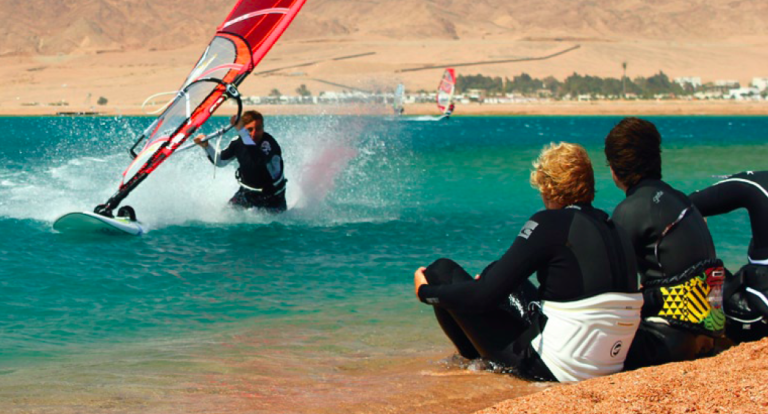“When people are struggling to master advanced skills often it’s not about technique but something else like their kit’s not set up quite right, for example.”
Sam Ross reflects on why good windsurfers, even those with hundreds of hours sailing time under their boards, do intermediate and advanced training.
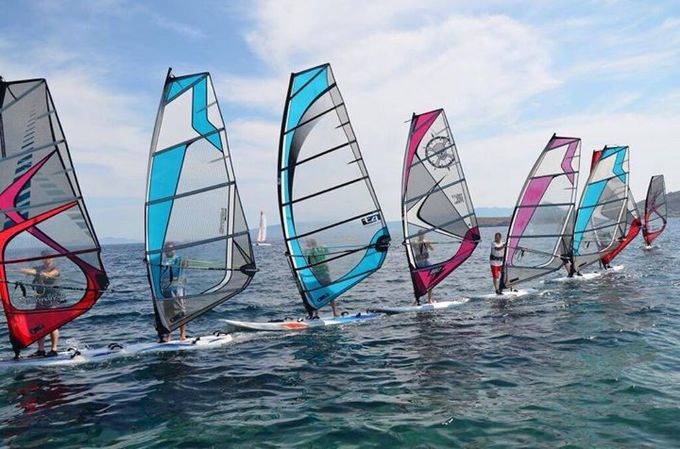
When you first stepped on a board, did you hang on your instructor’s every word, waiting to be told exactly where to put your feet, to put your hands on the centerline and when to pull your body in? We all did!
What about since? How much of your learning has come from trying to copy stuff you’ve seen on YouTube or your friends pull off compared to things you’ve learned from an instructor? Put another way, have you mastered the carve gybe yet?
“If Start Windsurfing is the only course people have done, they will get better on their own by working stuff out, but there typically comes a point where they plateau and stay at the same level,” Sam continues.
“An instructor can take a step back, look at what they’re doing objectively and see where problems are, that’s the real value of further training. The little things can make the biggest difference, like the moment you say ‘If you change the boom height the outhaul tension changes’ and they go ‘Oh yeah!’ and then kick on.”
The Training Tree

It only takes a prolonged period of frustration at not being able to get to grips with a certain skill, or one slightly hairy execution, for someone to give up altogether. Not ideal. But the RYA’s National Windsurfing and Youth Windsurfing schemes at Intermediate and Advanced level have been developed to help avoid such plateaus.
The two-part Intermediate course covers planing and non-planing where new techniques like beach starts, harness work, getting into footstraps and faster tacks are honed while the basic technique of carve gybing is introduced.
Advanced courses and clinics then help you master dynamic transitions, planing gybes, carving techniques and waterstarts.
The schemes use the Fastfwd coaching model, comprising five elements – Vision, Trim, (Counter) Balance, Power and Stance – which underpin all movements on a board, with the aim to develop robust windsurfers confident in the full range of conditions on all types of kit. The skills mastered mean windsurfers can explore any or all disciplines, whether wave, freestyle, racing, slalom or speed, with combinations of all often used in courses and clinics to progress the same skill.
The RYA schemes also take into account that, as people improve the way they want to learn changes too. For beginners it’s very much a student / teacher relationship with instructors evolving into more of a coach at intermediate to higher level.
Sam continues: “The Fastfwd method is a toolkit to help students self-analyse and diagnose where they’re going wrong themselves. By the end of Advanced courses the feedback comes from them not from instructors barking teaching points. Clinics then provide the chance to focus on mastering one particular skill; everyone there has a common goal applying what they’ve learned in bite-size, focused and fun sessions.”
Location, location, location
Conditions may vary inland or on the coast, at home or overseas, yet the opportunities to get Intermediate and Advanced RYA tuition is never far away.
For example, from its waist deep flat water that can be used in any wind direction to the wave sailor’s paradise of Sandbanks, Poole Harbour is a windsurfing Mecca. Yet these conditions can also be counter-productive in beginners progressing, as Dave Hartwell, founder and Principal at Sandbanks-based Watersports Academy, explains.
“Although Poole Harbour is the perfect place to windsurf, because it’s shallow at both ends sailors can never learn to turn their kit around. Without tuition the rate of progression is very slow, which can lead to frustration. Formal RYA tuition keeps windsurfers windsurfing.
“Once people have learnt the basics we find they either buy equipment from the shop or sign up to our Academy hire scheme. During this time many return for shorter, more bespoke lessons aimed at getting them from across the harbour to feeling comfortable in deeper waters off the beach. We also run advanced clinics for water starts, fast tacks and carve gybes, keeping groups small for more direct tuition.”
Moving inland, it’s typical to see advanced windsurfers blasting, jumping and looping on a windy day at Queen Mary Sailing Club, near Heathrow. At 700 acres with mile-long reaches, the club is finding innovative ways to get more people of all generations windsurfing to higher standards.
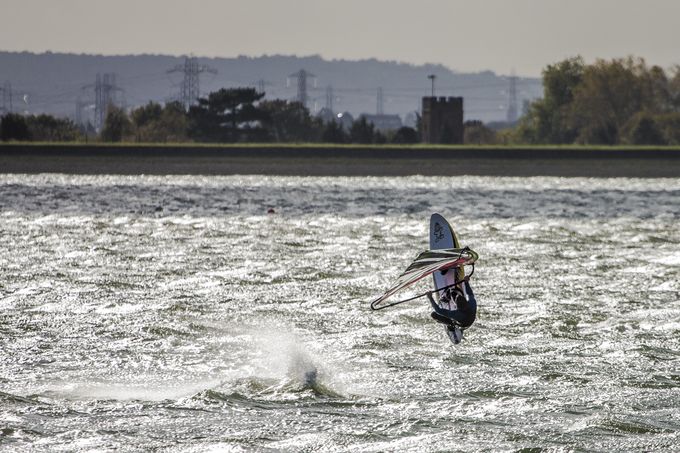
Paul Adams, Chief Windsurf Instructor, explains: “To bridge the Start/Intermediate gap we have group coaching to prepare students for the Intermediate course, and offer intermediate and advanced clinics all year specialising in elements such as waterstarst, gybe variations, jumping and more.
“On our Select membership package people paying monthly can attend these advanced courses, hire kit and use the water for free all year round.
“Alongside we offer professional clinic days for non-members too, last year we had Simon Bornhoft, and hold regular ‘chats’, social events and trips. If you’ve never had training, all ages and experience can benefit from someone knowing how to decipher your windsurfing, breaking it down into bitesize chunks. Using vision as the base of a new manoeuvre, for example, could be the thing to help you nail that new trick!”
In Scotland, Galloway Activity Centre has a collaborative approach to advanced tuition. Many kids are introduced to the sport for the first time as part of residential courses at the centre, while non-planing intermediate training is their bread and butter, with popular clinics on getting into footstraps and harness work.
But as an inshore loch, with fickle winds, planing can’t be guaranteed so Galloway recommend people wanting advanced training getting to the Isle of Tiree, the most westerly island in the Inner Hebrides, famed for its outstanding windsurfing.
Richard Hermon, Training Principal at Galloway, said: “We’ve got the facilities and the equipment and if we get the conditions we’ll do planing, but it can be hit and miss so we don’t promote it. In Tiree you would be very unlucky not to get planing conditions; it’s a fantastic venue for advanced courses.
He adds: “Kids are more tuned into course progression now than adults, they like to walk away with a certificate. Adults like the clinic format but what they are learning is still all part of the RYA intermediate training syllabus.”
Tailoring for your audience is something active holiday specialists Neilson have perfected. Recent figures suggest 30% of their Beach Club customers do some windsurfing on holiday, and their return rates year-on-year are very high as people who may struggle to get out windsurfing at home get their annual ‘fix’ on holiday.
This is why Simon Davies, Overseas Operations Manager at Neilson and an RYA windsurfing instructor, believes they have a responsibility to make sure guests get top quality tuition on holiday whatever their level.
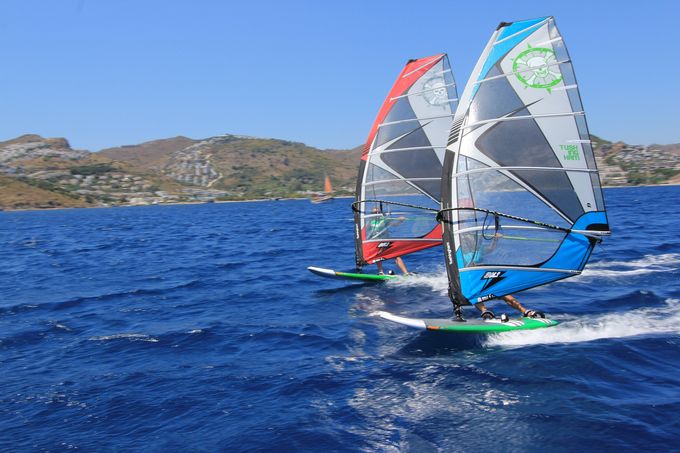 “The RYA syllabus gives recognised Training Centres a framework to deliver training but it doesn’t tell us how we must do it so our guests have the freedom to come and go as they please and do sessions whenever they want but all the sessions they do, however advanced and whenever they do them, are to RYA standards.
“The RYA syllabus gives recognised Training Centres a framework to deliver training but it doesn’t tell us how we must do it so our guests have the freedom to come and go as they please and do sessions whenever they want but all the sessions they do, however advanced and whenever they do them, are to RYA standards.
“It’s important to us that people receive proper training and can get a logbook and certificates if they want them, as we want them to continue in sport, not just on our holidays but when they get home too. With RYA training they can go to any other RYA training centre and pick up where they’ve left off.
“Ultimately we all want people to continue in the sport, and learning the right things at all levels promotes that.”
Find out more about RYA Training at www.rya.org.uk/training
Love Windsurfing? Then why not join the association that promotes and protects, safe, successful and rewarding British windsurfing. Join today and support the RYA in protecting your rights and freedoms. Take advantage of free advice and support on a wide range of windsurfing topics; enjoy free third party insurance, as well as a fantastic range of personal member offers. Find out more by calling 0844 556 9556, email [email protected] or visit www.rya.org.uk

